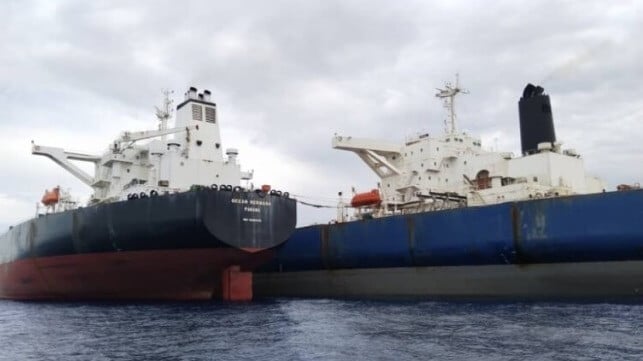Panama is First Registry to Enforce Rules to Crack Down on STS Actions

The Panama Ship Registry started its new rules as of August 6, requiring reporting of planned ship-to-ship (STS) offshore oil transfers as the latest step in a series of crackdowns targeting the shadow tanker fleet. Panama had announced plans for the new rules in May, and highlights that with the rule now in effect, it has become the first registry in the world to implement stricter controls and mandatory traceability for offshore ship-to-ship (STS) transfers of hydrocarbons.
“This measure responds to the increasing use of vessels in illicit activities such as covert crude sanctions evasion, and operations lacking controls, practices often associated with the so-called “shadow fleet,” the Panama Ship Registry says in its announcement. It warns that “non-compliance—depending on its severity—may lead to the cancellation of a vessel’s Panamanian registration.”
The regulation requires all Panamanian-flagged oil tankers with a gross tonnage of 150 or more to notify the Panama Maritime Authority (PMA) at least 48 hours in advance, providing full technical and logistical details of each STS operation. In addition to the details on the vessels involved, they must supply the location, the type of transfer, and the quantity to be transferred. If the operation varies by more than six hours, the captain or shipping company must update the details reported to the PMA.
The shipping companies are also required to supply contact details for a designated person ashore. They must also confirm that the STS plans are in accordance with the IMO’s MARPOL Convention.
Putting the STS rule into effect follows another move by the registry this week, also targeting the shadow tanker fleet. It said it will no longer accept the registration of tankers (and bulkers) that are more than 15 years old. It said an analysis of data showed the older vessels accounted for most of the detentions.
Panama, under pressure from the U.S. and others, has moved to purge its registry and enacted new rules to make it faster and less complicated to remove ships that are sanctioned or have other violations. Demonstrating this, Panama reported this week it had removed 17 tankers sanctioned days earlier by the United States in a crackdown on an Iranian shipping network.
Panama is the latest in a growing number of jurisdictions seeking to tighten enforcement against the shadow tanker fleet. Greece, last year, closed a bay favored by tankers in the Russian oil trade. Last week, Malaysia, which is already known for its enforcement against illegal anchoring, announced new rules on another key area favored by shadow tankers to make transfers. Malaysia created new anchoring regulations and closed the area to most tankers. In Europe, efforts have focused on the enforcement of the requirements for insurance and proper certification.
Despite this, the shadow tanker fleet continues to grow. The latest estimates put it at over 1,100 vessels, although the EU and UK sanctions have driven some tankers from the trade.
The efforts to reduce STS will impact tankers both in the Russian oil trade and those supporting Iran. Both are known to use STS and other efforts to hide the origins of the oil or to mix it with other sourced oil to make the blend less identifiable.
